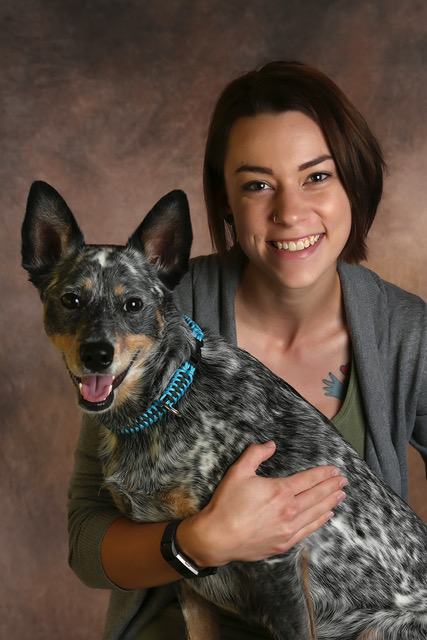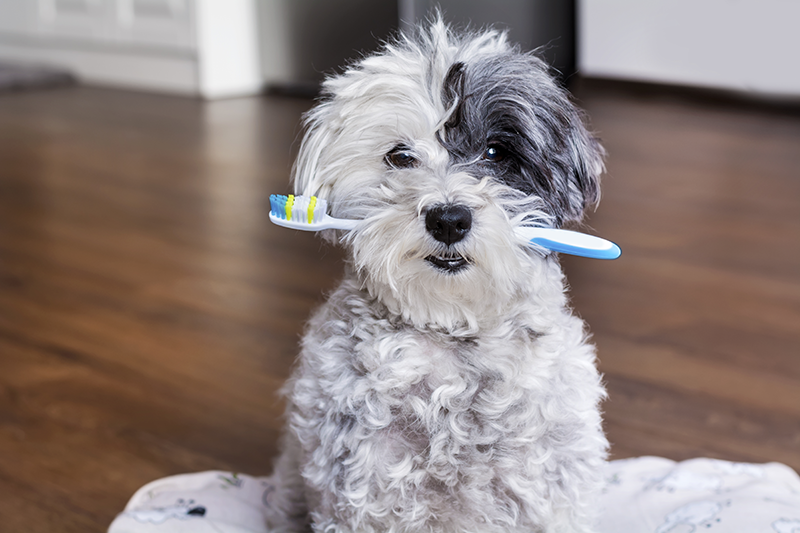National Pet Dental Health Month
February is National Pet Dental Health Month. Home dental care is very important for maintaining oral health and preventing systemic infections in both animals and people. The more frequently home dental care is performed, the better it is in maintaining good oral health. Please keep in mind that these steps are guidelines for dogs and cats who can be handled safely by their owners and who are not likely to growl or bite. If your pet has an aggressive tendency, this may not be a safe activity for you to perform. You may need to speak with your veterinarian to tailor your home dental care regimen to your individual pet.
The goal of dental brushing is to slow the progression of calculus (i.e. tartar) accumulation on the teeth. It is unlikely that you will be able to remove calculus that is already cemented on the teeth. Even with humans who brush multiple times a day and go to the dentist regularly, calculus still builds up between professional cleanings. You can imagine what is happening in your pet’s mouth! Genetics, breed, diet, and overall health can impact how quickly calculus develops.
As you begin working on home dental care with your pet, it is important to keep the activity very positive. Provide praise and positive reinforcement as you work on these steps. We want this to be a fun activity for everyone.
1) If you have a puppy or kitten, start early! However, it’s never too late to start, so don’t hesitate to start now with your older dog or cat. Begin to work on handling his or her mouth by first massaging the outside of the cheeks and lips, then by rubbing small areas on the outer surface of the teeth and gums. You do not need to pry the mouth open – you can focus your care on the outside surface. If your pet shies away from handling the mouth, take baby steps to get him or her used to this type of touch.
2) Once your pet is comfortable with basic handling, begin gently rubbing flavored pet toothpaste on the outside of the teeth, starting on one side of the mouth, then eventually the other side of the mouth, and the front of the teeth. You do not have to open the mouth, but rather slide your finger along the inside of the cheek and the outside of the teeth. Be sure to keep this positive and use an excited tone of voice to praise your pet. If your pet resists, work on offering the paste as a treat that they can lick from your finger. Continue these steps until your pet is comfortable. You may be able to target all of the teeth during one session, or if it is too stressful, you may need to divide the mouth into smaller areas and target one section at a time.
3) Once you’ve mastered these steps, try switching to a finger brush or soft toothbrush with the toothpaste applied to it. You can now try short intervals of brushing, but remember to keep the initial sessions short and provide praise. You can slowly increase the amount of time you are able to brush the teeth without your pet losing patience. Make sure to change your toothbrush every 3-4 months and always use a new brush after a professional dental cleaning.
Daily brushing would be excellent, if possible, but you should try to brush at least 2-3 times per week. Remember, the more often you brush, the more successful you will be at maintaining healthy teeth – and fresh breath! Do not try to scale or scrape your pet’s teeth at home. More vigorous home dental care such as scaling can actually create grooves in your pet’s teeth that attract more calculus.
While brushing is the gold standard, you may not be able to perform this activity with your pet every day. When you don’t have time to brush, you may try a dental treat such as a CET chew. As your pet chews on a CET chew, both the physical act of chewing as well as the enzyme ingredient inside can help remove calculus. This can be a great adjunct to brushing. Using a CET oral rinse daily or a special dental diet such as Hill’s Science Diet Prescription T/D may be alternatives for your pet if brushing is not feasible. You will find many products at the pet stores that are sold for dental health but you should be skeptical of these products. While probably not harmful, most of these products do not truly benefit oral care.
Your veterinarian will recommend a professional dental procedure if your pet develops excessive calculus, gingivitis, periodontal disease, tooth infections, or tooth resorptive lesions. Under general anesthesia, we thoroughly clean the teeth both above and below the gum line, assess gingival pockets, remove diseased teeth, and polish the teeth. Once your pet’s teeth have been professionally cleaned, try to maintain a healthy mouth at home with regular brushing using these techniques above.
If you have noticed bad breath, difficulty chewing, pain while brushing, or bleeding of the gums in your pet, schedule an appointment today to discuss the best oral care plan for your pet. You may reach us via phone (651-645-2808), email (group@stfrancisabh.com), or via our PetDesk app.
written by Dr. Patricia Novak and Dr. Jennifer Blair
Employee Spotlight: Becca Harnack
Each month, we will spotlight one of our team members in order of years of service at St Francis Animal Hospital.
Becca joined St Francis Animal Hospital in 2016 as a Veterinary Assistant, and transitioned into a Veterinary Technician role in late 2018. She graduated from the University of Wisconsin-River Falls with a Bachelor of Science (BS) degree in Animal Science with an Equine Management emphasis. While pursuing her undergraduate degree, she managed the University climbing wall, was president of the rock climbing club, and spent time as a wrangler in Glacier and Rocky Mountain National Parks.
She has applied for acceptance into the Doctorate of Veterinary Medicine (DVM) programs at the University of Minnesota and Washington State University, with hopes of entrance for Fall 2020.
She currently lives in Lakeville with her boyfriend, Travis; his red lab, Drake; her border collie mix Arrow; and her three legged cat, Grim. When she is not at work, she spends the majority of her time outside with Arrow hiking, but also enjoys Crossfit, rock climbing, reading, music and traveling.
Why do you love being a veterinary technician?

Over the years, I have cared for a large variety of creatures. As a child I rescued frogs, salamanders and turtles; kept rats, geckos, cats, dogs, and birds; and helped on my mother’s hobby farm with chickens, goats, pigs, horses and a stubborn miniature donkey named Amos. I love them all!
Working in veterinary medicine allows me to make a difference in animal’s lives, as well as be around like-minded people. Every day is different, and every day I learn something new.
Why do you love working at St Francis Animal Hospital?
I feel so lucky to have found such a talented and passionate group of people to work with, and I feel like I have found my second family. St Francis is unique in the way we offer top-notch care in combination with traditional and alternative therapies. Our clients are some of the kindest people I’ve met, and I have truly enjoyed getting to know them, along with their furry family members, during my time here.
Please let Becca know how much you appreciate the wonderful care that she provides to you and your loved ones every day!
Parasite Prevention: Instant Rebates & Promotions
Spring is just around the corner and it’s time to think about parasite prevention for your pets. Is your pet protected?
Each year, your dog should have a 4Dx Test. This is a blood test that screens for heartworm disease as well as the most common tick-borne diseases in Minnesota. A fecal evaluation should also be performed annually. In addition, all dogs need Heartgard Plus monthly year round to prevent heartworm disease and intestinal parasites.
Ticks can carry diseases such as Lyme disease, Ehrlichiosis, and Anaplasmosis. Your dog needs NexGard or Frontline Gold monthly for prevention of fleas and ticks. NexGard is a safe and effective oral preventative, while Frontline Gold is an excellent topical alternative for dogs.
2020 Rebates
Heartgard Plus: Buy 12 = $12 Instant Rebate
NexGard: Buy 6, Get 1 Free
Frontline Gold: Buy 6, Get 2 Free or Buy 3, Get 1 Free
Buy 12 Heartgard Plus + 12 NexGard or Frontline Gold = $60 Instant Rebate
Buy 12 Heartgard Plus + 6 NexGard or Frontline Gold = $35 Instant Rebate
Buy 6 Heartgard Plus + 6 NexGard or Frontline Gold = $25 Instant Rebate
We have earned the opportunity to be one of the first veterinary clinics in our area to be able to offer you instant rebates. This program allows us to provide these manufacturer rebate savings to you immediately — no more waiting for your rebate cards to arrive in the mail!
For cats, we recommend Revolution Plus. This monthly topical preventative protects your cat against fleas, ticks, ear mites, intestinal parasites, and heartworm disease. Cats are often overlooked, but these parasites can be dangerous and, in some cases, life-threatening. Prevention is key!
We will also be offering our Parasites and Your Pet Promotion. For dogs, when you buy 12 Heartgard Plus, a 4Dx Test, and a Fecal Parasite Profile, you will receive 10% off of the entire package. For cats, buy 12 Revolution Plus and a Fecal Parasite Profile and receive 10% off of the entire package. We want to help you protect your entire family against these dangerous infections.
For more information or to schedule your appointment, please call (651) 645-2808 or reach out to us via your PetDesk app.
News Briefs
Favorite Animal Hospital
We are honored to have won the MN Women’s Press 2020 Favorite Animal Hospital or Veterinarian in the recent Minnesota Women’s Press Annual Readers Recommend survey. Thank you so much to everyone who voted for us!
Paper Bags: Being Green!
We’re trying to reduce our impact on the environment as much as possible. You’ll notice that we’re trying to send home less plastic. Many of your medications and supplies will be sent home in paper bags instead of the plastic ones that we used to provide.
Welcome, Jasmine & Lisa!
We are excited to welcome Jasmine Curtis, our new Veterinary Assistant, and Lisa Anderson, CVT, our new Certified Veterinary Technician, to our family. Thank you to Debranique and Angie for recruiting them! Please wish them a warm welcome!

